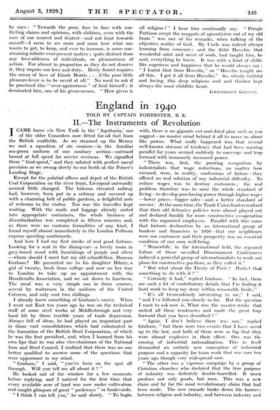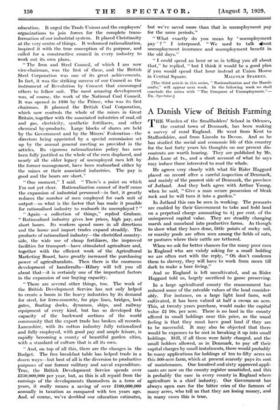England in 1940
TOLD BY CAPTAIN FORRESTER, R. E.
IL—The Instruments of Revolution
ICAME home via New York in the Aquitania,' one of the older Cunarders now fitted for oil fuel from the British coalfields. As we steamed up the Mersey we met a squadron of six cruisers—in the familiar sea-green uniform of our sanitary section—outward bound at full speed for service overseas. We signalled them " God-speed," and they saluted with perfect naval precision as we swung slowly to our berth at the Prince's Landing Stage.
Except for the palatial offices and depot of the British Coal Corporation on the river front, Liverpool outwardly seemed little changed. The hideous elevated railway had, however, been put in a subway and covered up with a charming belt of public gardens, a delightful note of welcome to the visitor. Nor was the traveller kept waiting. With the mails and luggage already sorted into appropriate containers, the whole business of disembarkation was completed in fifteen minutes and, as there were no customs formalities of any kind, I found myself almost immediately in the London Pullman express speeding southwards.
And here I had my first stroke of real good fortune. Looking for a seat in the dining-car—a lovely room in grey-toned wood with furnishings of purple and silver —whom should I meet but my old schoolfellow, Duncan Graham ? He presented me to his daughter Hilary, a girl of twenty, fresh from college and now on her way to London to take up an appointment with the Handicrafts Association, and we sat down to luncheon. The meal was a very simple one in three courses, served by waitresses in the uniform of the United Caterers, and only cost two shillings.
I already knew something of Graham's career. When I went out East ten years ago he was on the technical staff of some steel works at Middlesbrough and very hard hit by those terrible years of trade depression. Always full of ideas, he had played an important part in those vast consolidations which had culminated in the formation of the British Steel Corporation, of which he was the first president, and, when I learned from his own lips that he was also vice-chairman of the National Iron and Steel Council, I realized that there was no one better qualified to answer some of the questions that were uppermost in my mind.
" Graham," I said, " you've been on the spot all through. Will you tell me all about it ? "
He looked out of the window for a few moments before replying, and I noticed for the first time that every available acre of land was now under cultivation and caught glimpses of great " parkways " or boulevards.
" I think I can tell you," he said slowly. " To begin with, there is no gigantic cut-and-dried plan such as you suggest—no master mind behind it all to move us about like pawns. What really happened was that several well-known streams of tendency that had been running parallel for years seemed suddenly to converge and leap forward with immensely increased power.
" There was, first, the growing recognition by industrialists, that wage reductions, no matter how excused, were, in reality, confessions of failure—they offered no real solution of any industrial difficulty. To reduce wages was to destroy customers ; the real problem therefore was to raise the whole standard of living—to develop purchasing power through higher wages —lower prices—bigger sales—and a better standard of service. At the same time, the Trade Union leaders realized that their old defensive policies were almost played out and declared frankly for more constructive co-operation with the organized employers. Parallel with this came that historic declaration by an international group of bankers and financiers in 1926—that our neighbours were our customers and their prosperity was an essential condition of our own well-being.
" Meanwhile, in the international field, the repeated failure of those so-called Disarmament Conferences induced a powerful group of internationalists to work out plans for constructive pacifism, as they called it."
" But what about the Treaty of Paris ? Hadn't that something to do with it ? "
" Certainly it had," replied Graham. " In fact, there are such a lot of contributory details that I'm finding it hard work to keep my story within reasonable limits."
" It's all tremendously interesting to me," I said, " and I've followed you closely so far. But the question I want to ask now is, What was the master-stroke that united all these tendencies and made the great leap forward that you have described ? "
" Again, I don't believe there was one," replied Graham, " but there were two events that I have saved up to the last, and both of them were so big that they were almost explosive in their effect. One was the coming of industrial rationalization. This in itself demanded an entirely new conception of industrial purpose and a capacity for team work that was rare ten years ago though very widespread now.
" The other was a vigorous campaign by a group of Christian churches who declared that the true purpose of industry was definitely double-barrelled. It must produce not only goods, but men. This was a new claim and by far the most revolutionary. claim that had been made. The new crusade broke down the barrier; between religion and industry, and between industry and education. It urged the Trade Unions and the employers' organizations to join forces for the complete trans- formation of our industrial system. It placed Christianity at the very centre of things. It welcomed rationalization, inspired it with the true conception of its purpose, and called for a constructive council in every industry to work out it own plans.
" The Iron and Steel Council, of which I am now vice-chairman, was the first of these, and the British Steel Corporation was one of its great achievements. In fact, it was the striking success of our Council as the instrument of Revolution by Consent that encouraged others to follow suit. The most amazing development was, of course, the work of the National Coal Council. It was opened in 1930 by the Prince, who was its first chairman. It planned the British Coal Corporation, which now controls the whole of the mines in Great Britain, together with the associated industries of coal, oil and gas, electricity, synthetic fertilizers, and other chemical by-products. Large blocks of shares are held by the Government and by the Miners' Federation—the directors being appointed by a special commission set up by the annual general meeting as provided in the articles. Its vigorous rationalization policy has now been fully justified as the whole of the men displaced, and nearly all the older legacy of unemployed men left by the former management, have been reabsorbed either by the mines or their associated industries. The pay is good and the hours are short."
" One moment," I said. " There's a point on which I'm not yet clear. Rationalization cannot of itself cause the expansion of industrial personnel—in fact, it greatly reduces the number of men employed for each unit of output—so what is the factor that has made it possible for rationalized industry to reabsorb its unemployed ? "
" Again—a collection of things," replied Graham. " Rationalized industry gives low prices, high pay, and short hours. Its workers spend more in all directions and the home and import trades expand steadily. The products of rationalized industry—the electrified country- side, the wide use of cheap fertilizers, the improved facilities for transport—have stimulated agriculture and, together with the efficient work of the Agricultural Marketing Board, have greatly increased the purchasing power of agriculturalists. Then there is the enormous development of handicrafts—Hilary will tell you all about that—it is certainly one of the important factors in the expansion of our buying capacity.
" There are several other things, too. The work of the British Development Service has not only helped to create a boom in the heavy industries by its demand for steel, for ferro-concrete, for pipe lines, bridges, lock gates, floating docks, dynamos, ships, and railway equipment of every kind, but has so developed the capacity of the backward sections of the world community that the export trade has broken all records. Lancashire, with its cotton industry fully rationalized and fully employed, with good pay and ample leisure, is rapidly becoming a county of beautiful garden cities, with a standard of culture that is all its own.
" And, on top of all this, there are the changes in the Budget. The free breakfast table has helped trade in a dozen ways—but best of all is the diversion to productive purposes of our former military and naval expenditure. True, the British Development Service spends over £250,000,000 per year, but, as this is all repaid from the earnings of the developments themselves in a term of years, it really means a saving of over £100,000,000 annually in taxation as compared with ten years ago. And. of course, we've doubled our education estimates, but we've saved more than that in unemployment pay for the same periods."
" What exactly do you mean by ' unemployment pay ' ? " I interposed. " We used to talk about unemployment insurance and unemployment benefit in the old days."
" I could spend an hour or so in telling you all about that," he replied, " but I think it would be a good plan if you would spend that hour instead at Union House [The third article in this series, " Rationalization and the Handi- crafts," will appear next week. In the following week we shall conclude the series with " The Conquest of Unemployment"— ED. Spectator.]



































 Previous page
Previous page